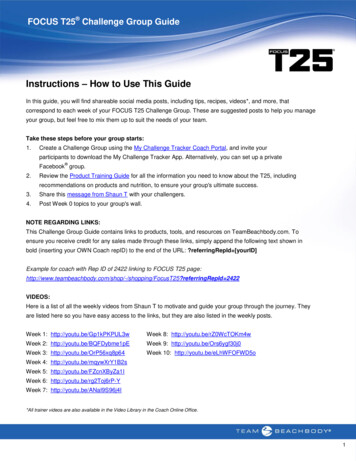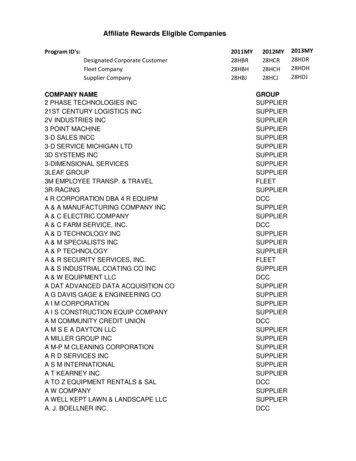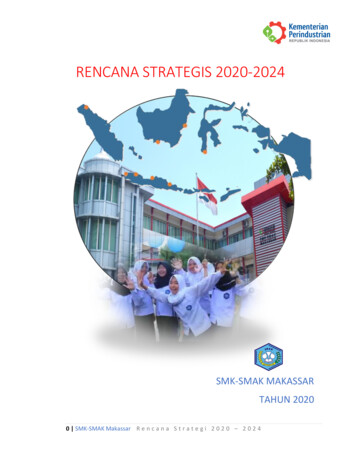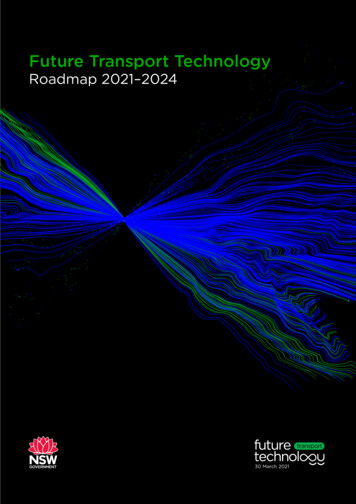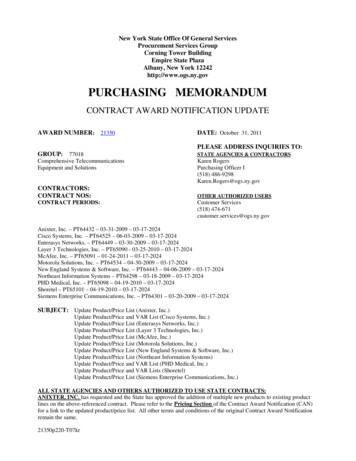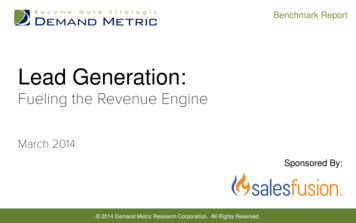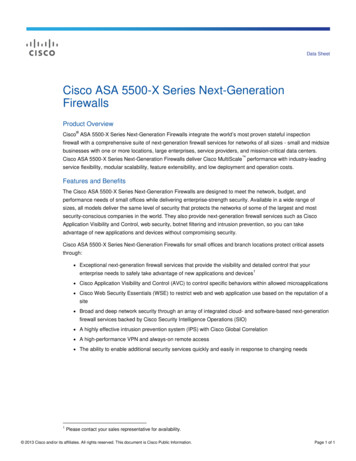
Transcription
UNDERSTANDINGGENERATIONALPHAgenerationalpha.com
UNDERSTANDING GENERATION ALPHAPublished byMcCrindle Research Pty Ltd105, 29 Solent CircuitNorwest NSW 2153AUSTRALIAmccrindle.cominfo@mccrindle.com.au 612 8824 3422All information contained in this report is believed to be correct and unbiased, butthe publisher does not accept responsibility for any loss arising from decisionsmade upon this information. McCrindle 2020. All rights reserved. No part of this publication may bereproduced, stored in a retrieval system, or transmitted in any form or by anymeans, electronic, mechanical, photocopying or otherwise, without the priorpermission of the publisher.
INTROThere is a generation that comprisesmore than 1 in 7 people, who areinfluencing the purchasing powerof their household and are key tothe future, yet few people haveheard of them. Within the next fouryears they will outnumber the BabyBoomers, and many of them will liveto see the 22nd century.We’re talking about GenerationAlpha, the current generation ofchildren who began being born inthe year 2010. They are the childrenof the Millennials, and often theyounger siblings of GenerationZ. There are 3 million of them inAustralia and more than 2.8 millionare born globally every week. Whenthey have all been born (2025) theywill number more than 2 billion – thelargest generation in the history ofthe world.While they are currently theyoungest generation, they havebrand influence and purchasingpower beyond their years. Theyshape the social media landscape,are the popular culture influencersand the emerging consumers.It is important to understand thetraits of Generation Alpha becausethey represent the future andprovide a lens through which tolook at the next decade and beyond.While Generation Alpha are currentlyour primary school students, bythe end of the 2020s the oldestwill be moving into adulthood, theworkforce and household formation,ready or not. If organisations wantto not only exist in a decade’stime, but thrive and flourish, thenunderstanding Generation Alpha andthe future they will be shaped in andcontribute to, is imperative.This paper is authored by MarkMcCrindle and Ashley Fell, twosocial researchers who are leadingauthorities on Generation Alphaand the emerging generations.We believe this complimentarywhitepaper will be invaluable for youin navigating and leading throughtimes of change.If organisations want to notonly exist in a decade’s time,but thrive and flourish, thenunderstanding GenerationAlpha is imperative.Mark McCrindleMark McCrindle is a demographer and socialresearcher, best-selling author, TEDx speaker andPrincipal of McCrindle Research. He is the authorof three books on emerging trends and socialchange. He coined the label: Generation Alpha,and is regarded as an international authority onGeneration Alpha.Ashley FellAshley Fell is a social researcher, TEDx speaker andDirector of Communications at the internationallyrecognised McCrindle. As a trends analyst sheunderstands the need to communicate with them.She is co-author of the book Generation Alphaand regarded as a leading expert and mediacommentator on Generation Alpha.3
1234Changingglobal order2.8M2.2 BillionNumber ofweekly birthsGlobally in 20255dsSiriAirPoArtificialIntelligenceOUTNokia 1100AppleWatch5G7Generation Alpha represent a whole newgeneration, entirely born in a new century.Going back to the beginning didn’t feelright for this next generation, so we’vemoved to the Greek alphabet.TechINMillennials - b. 1980-1994 Generation Gamma - b. 2040-2054The top namesthey are named AlphasTech India China IndonesiaWhysn GlaratioGene rseUpag lphasAenThal GeGlob modalsiMult8They are the children of the MillennialsThey will be parents to Generation GammaTop countriesof birth:6Other LabelsContextLandlinephoneDVDPagerCD9Whythey beganin 2010Generation Alpha began being born in theyear 2010, at the start of the digital erawhere devices dominated. They began inthe same year the first-generation iPad wasreleased and Instagram launched. Withthe typical generation length spanning 15years, the last of the Generation Alpha’swill finish being born in 2024.BoyGirl Noah Oliver William Olivia Ava Amelia10 MillennialsDiscmanNintendo64Joy OfMissing OutBroadcastMSN MessengerGangnam StyleXAlphaiPhoneFortnite (onany device)Fear OfMissing OutStreamingSnapchatBaby Shark
WHY WENAMED THEMGEN ALPHAJust over a decade ago, it becameapparent that a new generationwas about to commence andthere was no name for them.As a research agency with a keeninterest in generational analysis,we decided to test a few namesout with a survey of Australians.When we asked people whatthey thought the next generationshould be called, many peoplesuggested Generation A, havingcome to the end of the alphabetwith Generation Z. But GenerationAlpha represent a whole newgeneration, entirely born in anew century. Going back to thebeginning didn’t feel right for thisnext generation.Additionally, this was all takingplace just after the Atlantichurricane season of 2005, whenthere were so many storms thatthe normal alphabetic nameshad been used up and so for thefirst time, the Greek alphabetwas used, starting with hurricanealpha an, hurricane beta etc.That’s how the nomenclaturenaming in science works.So in keeping with this scientificnaming of using the Greekalphabet in lieu of the Latin,and having worked our waythrough Generations X, Y and Z,we settled on the next cohortbeing Generation Alpha – not areturn to the old, but the start ofsomething new.We have also found from ourgenerational research thatgeneric labels rather thandescriptive ones are likely to last.Names like the Baby Boomers,which describe a uniquedemographic phenomenon atthe birth of a generation, basedon the timing when the leadingedge were coming of age, are adeparture from the norm.A label like Generation X,Generation Z or Generation Alphaprovides a blank canvas on whicha generation can create theirown identity rather than have adescriptive label, relevant for justa segment of the cohort or for aperiod of time pinned on them.It’s a whole new generation and awhole new millennium, in a wholenew era. Hence Generation Alpha.Alpha – not areturn to theold, but the startof somethingnew.5
Generation Alpha began being born in the year 2010, the same year the first iPadwas released, and was Instagram launched. With the typical generation lengthspanning 15 years, the last of the Generation Alphas will finish being born in 2024.HOW WEKNOW SOMUCH ABOUTTHEM?We can predict a fair bit aboutGeneration Alpha by analysing thedemographics surrounding them,which give some forward forecasts:age of parents (older), cultural mix(more diverse), socioeconomics(slightly wealthier), family size(smaller), life expectancy (longer).THE WHO, WHAT,WHEN, WHEREAND HOW OFGEN ALPHAThen there is the research ontheir parents, the Millennials(or Generation Y) which givesus a sense of how they will beraised; more frequently movingand changing careers, materiallyendowed, technologically suppliedand outsourcing aspects ofparenting such as childcare.Finally, there is the analysis ofGeneration Alpha themselves intheir formative years, and we canlearn a lot from this too; app-basedplay, increased screen time, shorterattention spans and digital literacybut less social formation.TWEEN TOWNWe can also look at the current 8 to12-year-old market segment. We callthem tweens, those aged 8 to 12,who are “in-between” childhood andadolescence. Current tweens, a mixof Generation Alpha and GenerationZ (the children of GenerationX), have emerged as their owndemographic, and are now seenas brand influencers, a consumersegment, and a target market.Social media has been integral tothe development of tween identity.Many tweens are actively engagingon sites, uploading their ownYouTube videos and connectingwith friends on Facebook. Manywebsites are targeted specificallyat this demographic. Tweens cancreate virtual pets, play dress-up,and interact online with other peopletheir age.The relatively new world of‘tweendom’ is evidence of the‘upageing’ (growing up faster and ata younger age) of today’s emerginggenerations. These young peoplehave access to more technology,information, and external influencesthan any generation before them.6
WHY THEYMATTERGeneration Alpha represent thefuture and provide a lens throughwhich we can look to the nextdecade and beyond. While theycurrently populate our primaryschools, over the next decade theoldest will move through the teenyears to reach adulthood. Buteven still, these youngsters areinfluencing their millennial familypurchasing and are early adoptersof technology, having been bornentirely in the 21st century. Notonly that, they will be the largestgeneration ever, emerging while theworld is experiencing a shift to theAsian century. When the youngestGeneration Alphas hit adulthood (inthe mid 2030s), the largest middleclass component will be from Asia.HOW THEYCOMPARETO OTHERGENERATIONSGeneration Alpha will be the largestgeneration as we have a greaterpopulation than ever before. Theywill live for longer and will bemore culturally diverse comparedto the former generations. Theirtechnology makes them the mostglobally connected generation ever.They are deemed social, global andmobile as they will work, study andtravel between different countriesand multiple careers.Generation Alpha are ‘upagers’ inmany ways: physical maturity ison setting earlier so adolescencefor them will begin earlier—butbeyond the physical, social andpsychological, educational andeven commercial sophisticationalso begin earlier, which canhave negative as well as positiveconsequences.While adolescence begins earlier,it also extends later. The adult lifestage, once measured by marriage,children, mortgage and career isbeing pushed back. This generationwill stay in education longer, starttheir earning years later and so stayat home with their parents for longerthan was previously the case.The role of parents therefore spans awider age range, still caring at homefor their adult kids even into theirlate 20s. Generation Alpha will nodoubt prolong this trend. In Australiawe’ve labelled the stay at home20-somethings the KIPPERS, whichstands for Kids In Parents’ PocketsEroding Retirement Savings!7
SHAPED BYTECHNOLOGYGeneration Alpha is definedby technological devices likesmartphones and tablets,video games, driverless trains,autonomous cars and smartspeakers that speak back to you.This technology has only beendeveloped within their generationand it is all they have ever known.It is also being taken up quickerthan ever before. While radio took38 years to reach 50 million users,the television took 13, the iPod justfour, the internet three, Facebookjust one and the Pokémon Gophenomenon took just 19 days!Coming of age in unprecedentedtimes of change and rapidtechnological advancement,Generation Alpha is part of anunintentional global experimentwhere screens are placed in frontof them from the youngest ageas pacifiers, entertainers andeducational aids. This great screenage which we are all living in hasbigger impacts on the generationexposed to such screen saturationduring their formative years.From shorter attention spans tothe gamification of education,from increased digital literacy toimpaired social formation, thesetimes impact us all but transformthose in their formative years.Generation Alpha been raised as“screenagers” to a greater extentthan the fixed screens of the pastcould facilitate. For this reason,we also call them GenerationGlass. It is almost impossible topry Generation Alpha away fromtheir devices, which have beenprominent in their lives fromthe day they were born. Theirexposure to technology duringtheir formative years will have agreat impact on their lives. Theyhave been using these devicesfrom before they could talk, so weare yet to see the impacts of theirinteraction with screens. There willcertainly be some positives, butlike any other generation would, itwill provide Generation Alpha withsome unique challenges.WHO COMESAFTER?Generational definitions are mostuseful when they span a set agerange and thus allow meaningfulcomparisons across generations.That is why the generationstoday each span 15 years withGeneration Y (Millennials) bornfrom 1980 to 1994; Generation Zfrom 1995 to 2009 and GenerationAlpha from 2010 to 2024. So itfollows that Generation Beta willbe born from 2025 to 2039.If the nomenclature sticks, thenwe will afterwards have GenerationGamma (the children of GenerationAlpha) and Generation Delta, butwe won’t be getting there until thesecond half of the 21st century!8
ENGAGEMENTACROSS THEGENERATIONSGEN ZGEN ALPHAGEN BETAEmployableAdaptableEntrepreneurialExam resultsLearning skillsLife skillsPeersInfluencersArtificial oordinatorEmpowererEnlargerCredit ure l credentialsSocial validationPeer influenceChanging trendsFrequent disruptionContinuous volatilityED U C ATION OU TC OMESSC H OOL FOC U SM ARK E TIN GW ORK ST YL EID EAL L EAD ERPAYMENTSTEC H N OLOGYC ON SU MER TREN D SADV IC EBUSIN ESS C ONTEX T9
THE FUTURECONSUMERSGeneration Alpha are the most materiallyendowed and empowered generationever. They have been shaped in an era ofindividualisation and customisation wherethey can get their name printed into thestoryline of books, embroidered onto theirshirts or put on a jar of Nutella.Because of rapid advances in technologythere are many things Generation Alphawill not be accustomed to using. Just likerecord players, VHS and pagers haven’tbeen part of our day-to-day lives for anumber of years, the use of traditionaldictionaries, street directories or DVDplayers have similarly made their exit overthe last decade. Looking ahead, it is verylikely that Generation Alpha will never usea wallet, single-use plastics, listen to theradio as a device, participate in a writtenexam or set an analogue alarm clock.While Generation Alpha are yet to hit theirteens, they have brand influence andpurchasing power beyond their years,engaging with brands, toys and productsthat speak to the future needs of thisgeneration.IS THE FUTUREOF SUCCESSFULBRANDS JUSTTECH-ENABLEDTOYS?Parents are increasingly aware of thenegative consequences of too muchtechnology time – the isolationism andanti-social impacts. However, there is ahalo-effect for tech-toys which increaseconnectivity, facilitate community anddevelop social and global skills.10
WHAT KIND OF‘PLAY’ IS MOSTUSEFUL FORBRANDS TODEPLOY NOW,IN THE DIGITALAGE?They are more formallyeducated, yet less proficient inpractical skills, assessing risk,setting and achieving goals,and developing hands-oncomptencies.Parents are becoming aware of thelife-skills deficit evident amongstthe next generation. They are moreformally educated, yet less proficientin practical skills, assessing (andwhen appropriate confidentlyapproaching) risk, setting andachieving goals (whether sporting orotherwise), and developing handson competencies. Fun toys whichdevelop specific skills such as STEM(Science, Technology, Engineering,Maths), social competencies,entrepreneurial skills, strength andcoordination, financial literacy,innovation and resourcefulnesswill be favoured by parents andeducators.WHAT ARE THEDRIVERS THATARE IMPACTINGHOW TOYBRANDSENGAGEWITH THEIRCONSUMERS?Educational toys – the future of toys isnot just in the home but the classroomand the childcare centre. Educationis beginning earlier with 3 and 4 yearolds spending more time in childcare– and in facilities that have a focus oneducation and development. Thereforetoys, of educational benefit, are anessential part of the focus.Free toys – another change we areseeing is that sponsored educationalmaterials – once anathema toeducational institutions, are becomingmore acceptable as the barriersbetween education, business, andcommunity blur. With education (andhousehold) budgets under strain,corporations for altruistic and well ascommercial motives, will increasinglybe part of the education, communityand child-rearing domains – withbranded toys a means by which thissupport is delivered.11
THE FUTUREGeneration Alpha may never seea camera that requires film, andthey’ll never have to wait for theirphotos to be developed. The onlyphones they’ve ever seen also takephotos, record videos, access theinternet and play games—this is afar cry from landline telephonesthat could be taken ‘off the hook’!As such, a shift in educationalengagement is occurring forGeneration Alpha, with schoolsswitching from structural andauditory learning to engaging,visual, multimodal and handson methods of educating thisemerging generation.Because their parents will indulgethem in more formal educationand at an earlier age, GenerationAlpha will have access to moreinformation than any othergeneration gone before. Theirformal education has neverbeen equalled in the history ofthe world, with a predicted 1 in2 Generation Alphas to obtain auniversity degree.Generation Alpha willsurpass even the praised andsophisticated Zeds in termsof education, with 90 per centpredicted to complete high school,compared to 80 per cent today,and with the majority going on tofurther study in some form.Generation Alpha will haveaccess to more informationthan any other generationgone before.OF EDUCATION12
GREATER JOBMOBILITYWork will remain a key featureof life in the future, as it is now.Almost two in three employedAustralians work full time, and ofthese, more than half are puttingin 40 or more hours per week.However, the average length oftime workers stay in their rolehas shortened to just under threeyears.If this tenure continues throughthe working life of today’s schoolleavers, then they will have onaverage 18 different jobs over 6distinct careers. Many of thesefuture jobs don’t currently exist,with 65% of those enteringprimary school today predictedto end up working in entirely newjob types that don’t yet exist.2While technology is replacingjobs, it is also creating manynew ones, such is the fourthindustrial revolution we are nowin. When today’s senior schoolstudents were at primary school,there were still people employedas toll collectors on motorways!Now many of these studentsare learning skills in robotics,coding, social media marketing,app development and big dataanalytics.NEWGENERATION,NEWDECADE,NEW CAREEROPTIONSAs the emerging generationsbegin to consider their careeroptions, there are jobs availablein entirely new industries suchas nanotechnology, block-chain,cyber security, autonomoustransport and virtual reality.The jobs of the future will comenot only from technologicalchange but also demographicchange. The ageing population iscreating new opportunities, notjust in the aged care sector butother related industries. Recordbirth rates and more affluentparents are creating new childcareservices and carer roles. Fromcultural diversity to changingfamily structures, populationshifts create new demands andindustries.13
SKILLS NEEDEDTO THRIVE INTHE DECADEAHEADThe anticipated rise of automation hasled to a focus on developing 21st centuryskills for lifelong learning in students.Within this context, parents believestudents are most equipped with digitalskills and creativity (60 per cent and 57per cent, respectively). There is workto do, however, in the area of criticalthinking, the lowest ranked competencyby parents with just 43 per centbelieving students are extremely orvery equipped. As the world of workchanges, it is the character qualitiesas well as competencies that willfutureproof Generation Alpha. Parentsbelieve students are equipped withcuriosity (60 per cent) and adaptability(50 per cent), yet there is room toimprove in leadership skills (42 per cent).THE WELLBEINGFOCUSThe trend of wellbeing has been steadilyincreasing over the last few years,particularly in schools and in theworkplace. In the last five years, almosthalf of parents (48 per cent) haveincreased their expectations of theirchild’s school to support wellbeing.More than one in four (27 per cent) havesignificantly or somewhat increased theirexpectations.The parents of Generation Alpha,(Millennials; also known as Generation Y)are driving this expectation inflation withthree in ten (31 per cent) significantly orsomewhat increasing their expectationsof schools compared to one in fourGeneration X parents (23 per cent).As student wellbeing challenges rises inprominence, it is important for schoolsto understand parent expectations andthe school’s role in the wellbeing journey.Almost all of parents (97 per cent)believe schools should have a holisticfocus and play some role in themanagement of wellbeing, the questionis to what extent. More than two in fiveparents (46 per cent) believe schoolsshould provide individualised support forwellbeing but refer on to other experts.Generation Y teachers agree, seeingthemselves as the first line of defenceand will then refer on to other experts.The challenge for schools, however, isthat almost a quarter of parents (24 percent) believe schools should provideextensive individualised support for allwellbeing issues.Generation Y parents seem to be drivingthis viewpoint, being more likely thanGeneration X parents to believe schoolsshould provide extensive individualisedsupport for all wellbeing issues (28 percent cf. 21 per cent).3TODAY’S STUDENTS AREEQUIPPED WITH SKILLSAND CURIOSITY% of parents who believe students are extremely/very equippedCOMPETENCIESProblemsolvingDigital icalthinkingTeam work52%43%Communicationskills52%CHARACTER 42%14
THE FUTURE OFWORKMassive changes are happening to theworkforce, as some jobs disappear, andnew jobs emerge. Generation Alphas willhave careers in emerging fields such ascyber-security, app development andcryptocurrency. They will be lifelonglearners, holding multiple jobs acrossmultiple careers. They will also needto be adaptive, constantly upskillingand retraining to remain relevant tothe changes anticipated as they movethrough their working life.15
GENERATIONALPHA WILLLIVE LONGERAND WORKLATERGeneration Alpha will be students forlonger. They will stay longer in educationand start their earning years later,which will put them behind financially.By pushing back their working years toinvest more in education, this meansthey will stay at home for longer.Advancements in medicine andtechnology result in an ageingpopulation, so Generation Alpha will livelonger. Their adult life stage of work,marriage and having children will occurlater. They will also be wealthier as theywill work longer before retiring.For Generation Alpha, retirement willnot mean stopping work. Rather it willmean downsizing and downshifting,allowing them to stay active laterin life, as working into their 60sand 70s will become the norm.WORKWELLBEINGAs when, where and how we work shiftsover the next decade, Generation Alphawill be emerging into the workforce at atime when wellbeing will be at the top ofthe agenda. Even over the last few yearsit is clear that the topic of wellbeing isone that has resonated very strongly as arapidly rising issue.Our worker survey showed wellbeingto be the number one workplace issue,with 72 per cent of workers saying it isextremely or very important to them,ranked above sixteen other workplacecomponents.4 Among the emerginggenerations, there is an expectationthat all aspects of their life will providethe opportunity to thrive, and thereforeless tolerance for workplaces andorganisations that hinder wellbeing.Corporations are now employingwellbeing managers and many citybuildings have office concierges. Morerecently, devices and apps are focussingon furthering human wellbeing andflourishing, and this will be even more thecase for Generation Alpha, translating totheir expectations of the workplace.After a decade of digital disruptionand increasing velocity of change, the2020s will mark a decade of seekingsimplicity and personalisation of theservices we engage with. In a world ofscreen saturation, 24/7 expectationsand always-on technologies, the decadeahead will see people not so much turntechnology off, but to turning on appsand solutions to make life function moreefficiently and enhance their wellbeing.More than just an extension of theoutsourcing trend, consumers will pay apremium for simplicity and services thatare customised to their unique prioritiesand preferences.Generation Alpha willbe emerging into theworkforce at a timewhen wellbeing will beat the top of the agenda.16
PARENTING ANDLEADINGGeneration Alpha are the first generation ofchildren to be shaped in an era of portabledigital devices, and for many, their pacifiershave not been a rattle or a set of keys but asmartphone or tablet device. Those aged 8-12year in the United States (tweens) consumeon average 4 hours and 44 minutes of screentime per day for entertainment purposes.This increases to an average of 7 hours 22minutes for those aged 13 to 18.5 Such istheir multi-screening behaviour that this isexpected to increase for Generation Alphawho have been born into a world of iPhones,YouTube and Instagram.The new challenges for parents of GenerationAlpha centre on watching out for screenaddiction, cyberbullying and the managementof child-friendly content. While parents havesome unique challenges, it is encouragingto remember the Millennial parents ofGeneration Alpha have themselves beenshaped in the digital world, so are betterequipped to manage these complexities. It isalso important for parents to remember thatdespite seemingly overt differences, somebasic dynamics between parents and childrenare timeless.For 21st century parents, the input oftheir own parents and the sage adviceof grandparents have never been moreimportant. The role of grandparents hassignificantly stepped up in our society asthey play important roles in the lives ofGeneration Alphas. Baby Boomers have adepth of life experience and knowledge theycan instil in their grandkids to stay connectedin their lives. Grandparents now also takeon a larger caring role as Generation Alphasparents, the Generation Ys, are working more.Generation Alpha are looking to parents andleaders for guidance. Parents need to giveGeneration Alpha confidence, as many youngpeople face insecurities and mental healthissues about an uncertain future that isconstantly being painted for them.Parents should encourage Generation Alphato invest in the future. By investing in trainingand education in both life skills and peopleskills, Generation Alpha can remain relevantand have the confidence to move forward.17
A POSITIVEOUTLOOK FORTHE ALPHASThe outlook for Generation Alpha is positive, even amidst somuch change. We are talking about a generation that will livelonger, work later, will be more formally educated, materiallyendowed and globally, will be the wealthiest generation to date.Every generation is a reaction to the one that came beforeit. The Baby Boomers were the protest generation; radical,started careers young and climbed the ladder early. Millennialswere quite the opposite; conservative in some ways and morerisk averse. While the Baby Boomers were the free-range kidapproach, the Millennials were very structured and planned.We are talking about a generationthat will live longer, work later,will be more formally educated,materially endowed and globally,will be the wealthiest generationto date.18
When we compare Millennials to Alphas,we predict that the Alphas will havechildren earlier than their parents, with abiological limit to the rising age of firstbirth of parents, will we see a higherfertility rate for the Alphas, meaning ayounger age of parents. We can alsoexpect Generation Alpha to seek out botha family and a career, even more thantheir Millennial parents have.Generation Alpha may never have heardof pay and gender equality issues, roadinfringements will not be an issue, theywill be ‘rentvesters’ who will prioritiselifestyle and view accommodation as aservice.The future of health will be moreadvanced for Generation Alpha than anyother. They will experience a shift fromprivate health insurance to a user paysystem or health savings fund. Moreconcerned about calorie intake andportion size, they will drink less alcoholand soft drinks, be used to a sugar tax,and engage with a rise in plant-basedproteins.Generation Alpha will also see differentmainstream approaches to alternateeating choices like non-diary options,with more health food options availableto them, as well as the regularityof devices that can monitor theirmovements and commodities, health andexercise.With sustainability and climate changeon the radar of their older GenerationZ siblings, Generation Alpha will growup with these political issues at theforefront of the agenda.The youngest Generation Alpha’s won’tneed a car or possible even a licensewhen they hit adulthood, with publictransport, Uber and driverless carsmaking these parts of modern life todayobsolete. They may never sit a writtenexam, vote in a traditional polling boothor own much, with the view that life (likeNetflix) is a service.While Generation Alpha will encountera lot of change, it is important toremember that some timeless humanneeds do not change. Amidst all thechange, Generation Alpha will still craveacceptance, community and belonging.These timeless human needs, whileexpressed differently over time, will bethe key drivers for Generation Alpha andare important for leaders, organisations,parents and community groups tokeep in mind as they lead GenerationAlpha through the next decade and intoadulthood.Amidst all the change, GenerationAlpha will still crave acceptance,community and belonging.19
A FINALWORDAs we look to the future and the decade ahead, to bestserve this next generation it’s important t
understanding Generation Alpha and the future they will be shaped in and contribute to, is imperative. This paper is authored by Mark . of three books on emerging trends and social change. He coined the label: Generation Alpha, and is re
